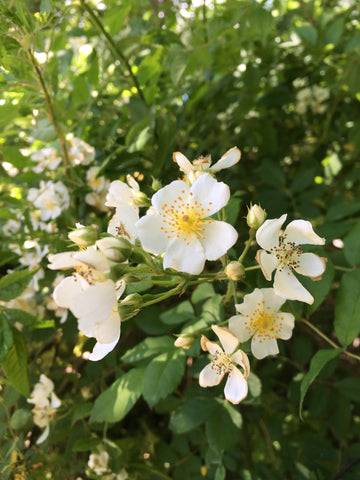Scrappy, persistant, and widely considered invasive, Multiflora (Rosa multiflora) is probably not the most popular rose to use for medicine. The eye-catching Rugosa, for one, outshines the tiny white petals of Multiflora with its deep pink flowers and intoxicating scent. And yet, although it isn't as showy and popular as its wild sisters, Multiflora still has medicine to offer. Because they are so plentiful and easily accessible, I think it's a great idea to work more with these roses. You can also think of it as controlling an invasive species!
Energetically, I find Multiflora roses to be astringent and a little warming. They're a good choice for damp conditions, helping to tone and tighten lax tissues (this is what makes rosewater and rose creams such sought-after potions for the skin). They are a wonderful vulnerary (wound healer), circulatory stimulant, mild aphrodesiac, and help fight infection.
And last, but definitely not least, they are a relaxing nervine and tonic for both the physical and emotional heart.
That makes sense, doesn’t it? Think of how you feel when you see a rose, or any beautiful flower. It’s really uplifting, and a little comforting, right? And the smell…how could that not cheer you up and make you feel calmer? Just being around the fragrant flowers, harvesting them and making medicines with them has a healing effect in itself.
The blossoms, fresh or dried, make a nice, delicate tea. Just steep a tablespoon or so in hot water for about ten minutes and enjoy.
My favorite way to use multiflora is in the form of a glycerite - it seems to capture that delicious fresh rose scent, and the warming sweetness has a very relaxing effect. To make a it, simply fill a pint jar with blossoms (it's all right if a few leaves end up in there, too), and then cover them with a ratio of 80% glycerine to 20% distilled water. Cover the jar and let sit for six weeks, shaking once a day or so, and then strain. I like to decant it into little 1/2 ounce dropper bottles to share with friends. A little goes a long way, too - just a few drops can yield a calming, mood-lifting effect.
An elixir of brandy and honey is a wonderful way to capture the medicine of rose, too. Simply use the same method and ratio as you did the glycerite, but substitute brandy and honey for glycerite and water, respectively (80% brandy, 20% honey... you can tweak the ratios depending on how sweet you want it to be). Let sit six weeks, shaking occasionally, before straining and bottling.
To make an yummy rose-infused oil for the skin, fill a jar about half way with roses, and then to the absolute brim with the oil of your choice (leaving no room for oxygen helps to prevent mold growth, which is a concern if using fresh plants. Alternatively, you can dry your roses for a day or so before making your oil.). Sweet almond, apricot or grapeseed are excellent, light oils for face serums and creams, while olive is the way to go if you want a rich, healing body oil or intend to make a salve. I use a mixture of apricot and sweet almond to make my Wild Rose Face Cream. Let the roses infuse in the sun for 3-6 weeks, shaking often, before straining.
Spend a while with wild rose - gathering the flowers and putting together these simple recipes can yield you enough warming, uplifting, heart-mending medicine to last you through the year.






Ironically I also live in Morgan county Ohio and was looking for something to do with the multiflora because there’s so much of it lining our field. I love to forage and I need to get some exercise in so going off to collect roses seems like a plan
This was so helpful! Multiflora rose has popped up on our property for the first time, so I’m excited to use it!
Thank you for the article, Alison. I live in Morgan County Ohio, home of the largest strip mine bucket. Multiflower rose was introduced for hedgerows and it has spread, taking over fields, etc. We like it because it makes great cover for wildlife. Surrounding farmers take special classes to poison it. We haven’t used any chemicals on our land in the 48 years we’ve lived here, so we have plenty multi flower rose. I’ve been interested in medicinal properties of invasive species. I’m going out to harvest some flowers right now. Their scent is heavenly. Thanks again! Heide